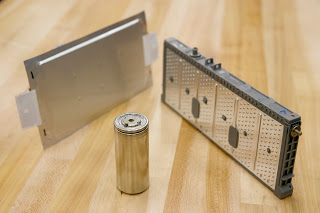He talks about a “freight car full of political baggage” due to the A123 Systems bankruptcy, and tries to tell us the “the real reason electric vehicles and their miraculous mpgs aren’t swamping the nation’s roadways” is because of the batteries, describing battery packs as being equivalent to a “coal tender”. For those of you too young to remember steam locomotives, a coal tender is a car immediately behind the steam engine that holds coal. Part of the job of the train engineers was to repeatedly shovel coal from the tender into the furnace.
One of those problems is when the battery pack runs out. Repeating the “coal tender” analogy, he says “When the energy — coal, wood, electrons — stored in those vessels ran out, the wheels stopped moving, and the passengers grew very, very irate.”
- Electric cars are fatally flawed and battery packs can never be the solution
- The only solution is an impossibly expensive public works project that would be politically impossible to get going, and would entail ripping up every street in the country
- Highway design could decrease death and injury risk, if “we” chose smarter designs - March 28, 2015
- GM really did trademark “range anxiety”, only later to abandon that mark - March 25, 2015
- US Government releases new regulations on hydraulic fracturing, that some call “toothless” - March 20, 2015
- Tesla Motors magic pill to solve range anxiety doesn’t quite instill range confidence - March 19, 2015
- Update on Galena IL oil train – 21 cars involved, which were the supposedly safer CP1232 design - March 7, 2015
- Another oil bomb train – why are they shipping crude oil by train? – Symptoms of fossil fuel addiction - March 6, 2015
- Chevron relinquishes fracking in Romania, as part of broader pull-out from Eastern European fracking operations - February 22, 2015
- Answer anti- electric car articles with truth and pride – truth outshines all distortions - February 19, 2015
- Apple taking big risk on developing a car? Please, Apple, don’t go there! - February 16, 2015
- Toyota, Nissan, Honda working on Japanese fuel cell infrastructure for Japanese government - February 12, 2015










